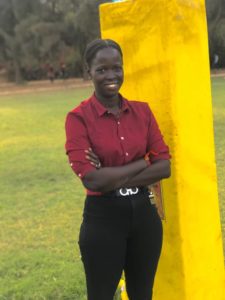January 2021 was a significant month for Fatou (Fifi) Diamé and women’s rugby in Senegal in general, with the international player making history by becoming the first female to coach a men’s team in the country.
In light of this big achievement, Rugby Africa invited the talented 26-year old coach and mother of a five-year old daughter from Thiès, to tell us more about her journey to this point and what this opportunity means to her.
Did you ever think that you would become the first female coach to guide a men’s team in Senegal?
Frankly, I never thought about it until I achieved this year
What does this coaching position mean to you?
This coaching position has come with a great responsibility because the spotlight is on me, so I feel that I cannot fail, and for that I have to arm myself with the courage to achieve the team’s objectives. This is the start of a great adventure and it gives me pride to coach such a great team.
How has rugby changed your life?
Rugby has changed many things in my life. I have become more confident, which has enabled me to assert myself as a woman in this male-dominated environment. I have also learned to share the values of rugby and to live by them every day. Rugby has allowed me to learn through training, to travel, to meet people of other nationalities, and to exchange information with them about our cultures. In addition to this, it has made me more open-minded.
How did you first get into rugby coaching?
I am an international player, but I didn’t want to limit myself to that, so I got involved in refereeing and then I asked myself why not get into coaching? I also realised that there weren’t many females moving in that direction.
I was also inspired and encouraged by our Rugby Africa Unstoppable, Fatou C. Sene, who is more commonly known as Bobo La Grande. She has motivated a lot of women to set goals and giving them the means to achieve that.
What are the biggest challenges you had to overcome to be where you are today?
Criticism from neighbours, friends and family who view rugby as a men’s sport and don’t see a future in the sport for women.
There are also men in the industry who sometimes do not accept being led by a woman.
Name the other teams you have coached before?
The only team I have had the opportunity to coach are the Yoff Panthers
Who have been the most influential people in your rugby career and why?
Papis Djiba Kondé (former DTN of the Senegalese Rugby Federation). He was my first coach and he taught me everything I know about rugby today. He inspired me the most, and I am following in his footsteps by coaching because he was such a good coach.
What are your rugby goals and dreams going forward?
My goals are to contribute to the development of women’s rugby in Africa, and particularly in Senegal; to coach a men’s or women’s national team; become a trainer; and to integrate the international Rugby bodies (Rugby Africa and why not World Rugby).


